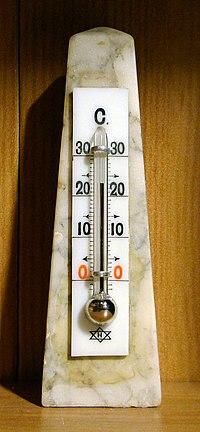
Photo from wikipedia
Transgenic ever-bearing strawberry (Fragaria×ananassa Duch. 'HS 138') was cultivated in a closed plant production system to produce functional proteins that can enhance human immune functions. We investigated the effects of… Click to show full abstract
Transgenic ever-bearing strawberry (Fragaria×ananassa Duch. 'HS 138') was cultivated in a closed plant production system to produce functional proteins that can enhance human immune functions. We investigated the effects of air temperature before harvest on fruit growth and the concentration of human adiponectin (hAdi) at harvest in transgenic strawberry. During the different stages of maturity (mature white and immature green stages), hAdi-expressing plants were exposed to four air temperature treatments (15, 20, 25, and 30°C) under 24-h illumination provided by fluorescent lamps. Fruits were harvested at the mature red stage. The number of days to the mature red stage decreased with increasing air temperature, being the least at 30°C. Fruit total soluble protein (TSP) concentration increased with decreasing air temperature, particularly at 15°C, whereas fruit hAdi concentration tended to be higher under the 30°C treatment than under any other of the temperature treatments. There was no significant relationship between fruit fresh weight at harvest time and hAdi concentration within treatments, nor between the number of days to harvest and hAdi or TSP concentration. Although there were no significant differences in fruit hAdi content among treatments, hAdi production rate was the highest at 30°C because of the shortest duration to harvest. These results indicate that a higher air temperature promoted fruit maturation and accelerated the production of functional hAdi proteins in the fruit. For hAdi-expressing strawberry plants, exposure to 30°C may reduce energy consumption (lighting and air conditioning) for functional protein production under controlled environments.
Journal Title: Plant biotechnology
Year Published: 2019
Link to full text (if available)
Share on Social Media: Sign Up to like & get
recommendations!